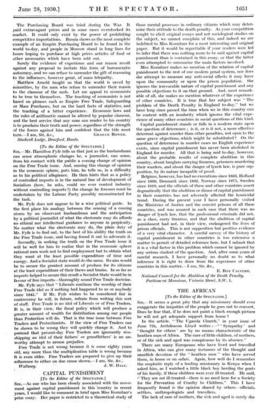[To the Editor of the SPECTATOR.] SIR,—Mr. Hamilton Fyfe tells
us that just as the husbandman can sense atmospheric changes he, a journalist, can sense, from his contact with the public a coming change of opinion on the Free Trade issue. And, sensing this change of opinion in the economic sphere, puts him,- he tells us, in a difficulty as to his political allegiance. He then hints that as a policy of controlled imports is in the natural line of development of Socialism (how, he asks, could we ever control industry without controlling imports ?) the change he foresees must be undertaken by the Labour Party possibly reconstructed for the task.
Mr. Fyfe does not appear to be a wise political guide. In the first place his analogy between the sensing of a coming storm by an observant husbandman and the anticipation by a political journalist of what the electorate may do affords no ethical nor intellectual guidance to anyone in perplexity. No matter what the electorate may do, the plain duty of Mr. Fyfe is to find out, to the best of his ability the truth on the Free Trade issue, and having found it out to advocate it.
• Secondly,. in seeking the truth on the Free Trade issue it will be well for him- to realize that in the economic sphere rational men work not to find employment but to obtain what they want at the least possible expenditure of time and energy. And a Socialist state would do the same. Its aim would be to secure the greatest amount of produce for its citizens at the least expenditure of their thews and brains. In so far as imports helped to secure this result a Socialist State would be in favour of free imports—thoroughly sound Free Trade doctrine.
• M. Fyfe says that "Liberals continue the worship of their Free Trade idol as if nothing had happened to us or anybody since 1845." If Mr. Fyfe wishes to be considered .fair in Controversy he will, in future, refrain from writing this sort of stuff. Free Trade is no idol of Liberals or of Free Traders. It is, in their view, the fiscal policy which will produce a greater amount of wealth for distribution among our people than Protection will do. That is the true issue between Free Traders and Protectionists. If the view of Free Traders can be shown to be wrong they will quickly change it. And to pretend that. present-day Free Traders are ignorantly Wor- shipping an idol of their fathers' or grandfathers' is an un- worthy attempt to arouse prejudice.
Free Trade is not wrong beeause it is some eighty years old, any more than the multiplication table is wrong because it is even older. Free Traders are prepared to give up their adherence to either on due cause shown.—I am, Sir, &c.,


















































 Previous page
Previous page